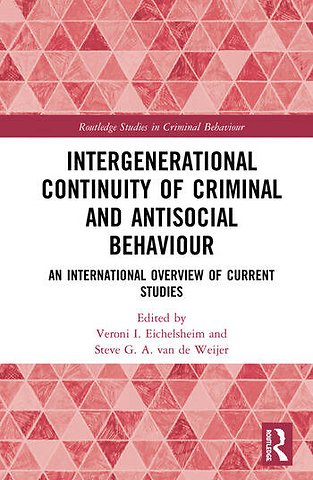Intergenerational Continuity of Criminal and Antisocial Behaviour
An International Overview of Studies
Gebonden Engels 2018 1e druk 9781138103375Samenvatting
The relationship between a parent and a child is without any doubt one of the most influential and intimate relationships over the life course of an individual. Children resemble their parents in a variety of life outcomes such as socioeconomic status, family formation characteristics, and political views. There is growing evidence that some families – despite interventions by child protection services, judicial sanctions, and social mobility – are stuck in patterns of criminal behaviour, poverty, substance abuse, teenage parenthood, and other negative life events. This is a growing global problem for which currently no solution is available.
This book brings together the most important and unique findings of intergenerational studies of criminal behaviour from around the world, and from a variety of disciplines, from criminology to sociology to anthropology. Each chapter explores the historical background of a specific study, its most important objectives, and the unique conclusions and implications that can be drawn from the data.
Essential reading for all those interested in criminal behaviour, psychological criminology, and intergenerational psychology, this book provides an extensive overview of intergenerational studies on patterns of continuity and discontinuity of criminal, antisocial, or delinquent behaviour, as well as related behaviours or risk factors such as the intergenerational continuities in (harsh) parenting and family relationship quality.
Specificaties
Lezersrecensies
Inhoudsopgave
Crime over the course of generations: Interdependent lives and risks. An introduction to ‘Intergenerational continuity of crime and antisocial behaviour: An international overview of studies’, (Veroni I. Eichelsheim and Steve G. A. van de Weijer)
Part I: Studies using General Population Register Data
1. Using register-linkage data to study intergenerational continuity of criminal offending – Finland as a case example, (Mikko Aaltonen and Janne Mikkonen)
2. Danish register data: Flexible administrative data and their relevance for studies of intergenerational transmissions, (Lars Højsgaard Andersen)
3. Studying the intergenerational transmission of crime with population data, (Ruben van Gaalen and Gregory Besjes)
Part II: Studies using Register Data
4. Exploring the life course and intergenerational impact of convict transportation, (Barry Godfrey, Hamish Maxwell-Stewart and Kris Inwood)
5. Intergenerational transmission of antisocial behaviour in childhood: Findings from the New South Wales Child Development Study, (Stacy Tzoumakis, Melissa Green, Kristin Laurens, Kimberlie Dean and Vaughan Carr)
6. The Transfive Study: Five generations of crime? (Steve G. A. van de Weijer and Catrien Bijleveld)
Part III: Studies using Survey Data
7. Intergenerational transmission of self-reported offending in the Cambridge Study in Delinquent Development, (David P. Farrington, Maria M. Ttofi and Rebecca V. Crago)
8. The Oregon Youth Study – Three generational study: A review of design, theory, and findings, (Deborah M. Capaldi, David C. R. Kerr, and Stacey S. Tiberio)
9. Aggression and criminality over three generations, (Eric F. Dubow, L. Rowell Huesmann, Paul Boxer, Cathy Smith and Aaron E. Sedlar)
10. Seattle Social Development Project – Intergenerational study (SSDP-TIP), (Jennifer A. Bailey, Karl G. Hill, Marina Epstein, Christine Steeger and J. David Hawkins)
11. Key findings from the Rochester Intergenerational Study, (Terence P. Thornberry, Kimberly L. Henry, Marvin D. Krohn, Alan J. Lizotte and Emily L. Nadel)
12. First results of cross-generational (dis-)similarities between three CrimoC-generations: The relationship between experienced violent parenting practice, delinquency and own parenting style, (Christina Bentrup)
13. The Cambridge-Somerville Youth Study and intergenerational transmission of criminal offending: Key findings and planning for the next generation, (Brandon C. Welsh, Steven N. Zane and Andrea B. Wexler)
14. The Family Transitions Project: An intergenerational study of three generations, (Monica J. Martin and Katherine J. Conger)
Part IV: Studies using Mixed Methods or Qualitative Data
15. The Ohio Life Course study: A follow-up of the children of delinquent girls and boys, (Peggy C. Giordano)
16. Qualitative research on the intergenerational transmission of antisocial behaviour in conflict-affected contexts: Case examples of Burundi and Rwanda, (Lidewyde Berckmoes and Ria Reis)
Discussion
The value of intergenerational data: A postscript to ‘Intergenerational continuity of crime and antisocial behaviour: An international overview of studies’, (Veroni I. Eichelsheim and Steve G. A. van de Weijer)
Appendix A
Appendix B
Index
Anderen die dit boek kochten, kochten ook
Rubrieken
- advisering
- algemeen management
- coaching en trainen
- communicatie en media
- economie
- financieel management
- inkoop en logistiek
- internet en social media
- it-management / ict
- juridisch
- leiderschap
- marketing
- mens en maatschappij
- non-profit
- ondernemen
- organisatiekunde
- personal finance
- personeelsmanagement
- persoonlijke effectiviteit
- projectmanagement
- psychologie
- reclame en verkoop
- strategisch management
- verandermanagement
- werk en loopbaan







